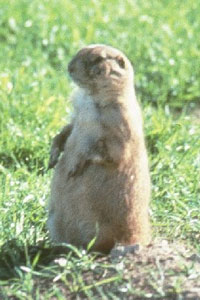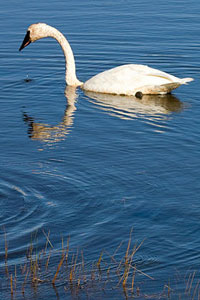Endangered Species Threatened by Bush
The Bush administration announced late Monday that it plans to streamline new regulations that could overhaul the Endangered Species Act. The announcement, made
Jul 31, 2020235 Shares234.6K Views
The Bush administration announced late Monday that it plans to streamline new regulations that could overhaul the Endangered Species Act. The announcement, made by the Interior Dept., came after a draft of the new rules was leakedto The Associated Press.
If adopted, the regulatory changes would give federal agencies the power to determine whether their own projects threaten endangered animals and plants, eliminating mandatory independent reviews by government scientists. Projects, including highways, power plants and dams, would only face independent review if an agency determined a negative or uncertain effect on endangered wildlife. The proposed rules do not require approval by Congress.
Illustration by: Matt Mahurin
Environmentalists are callingthis a "last-minute" "sneak attack" by the Bush administration — not only on the Endangered Species Act, but on science in general. Yet the Dept. of the Interior says the new rules are "narrow changes," meant to expedite government projects, not gut wildlife protections.
The Bush administration has been criticizedover the last eight years for trying to slash endangered species protections, but this latest move is the one that environmental activists say might make all the difference. The new regulations would result in the most sweeping overhaul of the Endangered Species Act in more than 20 years.
"We’re very alarmed," said Karla Raettig, an attorney for the National Wildlife Federation, "that the administration is trying to push such sweeping rollbacks on their way out the door. Alarmed but not surprised."
President George W. Bush, supported by some Republican congressmen, has tried to pass major changes to the Endangered Species Act legislatively, but to no avail. "Nothing is going to get through Congress," said Raettig. "The public supports the Endangered Species Act."
Legislative attempts aside, the Bush administration has a track record of trying to undermine the Endangered Species Act. A 2007 Interior Dept. internal investigation found that former Deputy Assistant Sec. Julie MacDonald, a Bush political appointee, was "heavily involved with editing, commenting on and reshaping the Endangered Species Program’s scientific reports from the field." (pdf here).
MacDonald was foundto have reversed U.S. Fish and Wildlife Service scientists’ decisions to identify species as endangered or threatened in at least six cases. The species affected included, for example, the trumpeter swan, the white-tailed prairie dog and the Gunnison’s prairie dog, both of the latter found by staff reports to be at risk of extinction.
Gunnison’s Prairie Dog (U.S. Fish and Wildlife)
In addition, under Bush, political appointees added significantly fewerspecies to the endangered species list than previous Republican and Democratic administrations. The Bush administration has added about 10 species a year — compared to the Clinton administration, which added about 64 a year; and the George H.W. Bush administration, which added about 59 a year, according to data obtained by The Washington Post. The current administration has also cut funding for endangered wildlife.
The proposed rules on the Endangered Species Act wouldn’t be the first time the administration has tried to avoid scientific consultation on government projects. In 2003, for example, the Environmental Protection Agency proposed a change to shield itself from litigation regarding the review process for pesticides.
Trumpeter Swan (Flickr: James Phelps)
But the proposed regulations announced Monday could do more to change the Endangered Species Act and its implementation than any previous action, according to advocacy groups like the Union of Concerned Scientists.
Meredith McCarthy, a researcher at the Union of Concerned Scientists’ Scientific Integrity Program, says the proposed rules are "cutting science out of the process."
"The law itself says it’s supposed to use the best scientific and commercial data available," she said. "This new rule is really cutting out the involvement of Fish and Wildlife Service biologists." That’s especially problematic, McCarthy says, because a big part of the mission of the Fish and Wildlife Service and the National Marine Fisheries Service is to execute the Endangered Species Act.
"I think the real point here is that [with] the agencies doing the projects, their main goal is to do the projects," she said. "So they may have some biologists on staff, but those biologists would be doing such a broad scope of different species. There’s no specialization there. Specialization in species — that’s what the Fish and Wildlife Service and the National Marine Fisheries Service are for."
The Sierra Club, another environmental advocacy group, says these repercussions could destroy the intent of the Endangered Species Act. "This would leave a hollow shell." said Sierra Club spokesman Josh Dorner, "rather than anything with any meaningful protections for our wildlife."
The new rules, he says, would "take any sort of objective, science-based decisions and take them out of the hands of experts, and put them into the hands of political appointees."
The Interior Dept. says that wouldn’t be the case, because agencies wanting to streamline projects have their own scientists. But some projects — certain Dept. of Transportation projects, for example — would not require evaluation by scientists, Dorner says.
More important, he adds, even agencies with their own scientists should be subject to oversight. "This is the worst kind of fox-guarding-the-hen-house scenario," he said.
Interior Dept. spokesman Frank Quimby disagrees. "We think there’s still going to be that oversight on projects that really have the potential of having an adverse impact [to wildlife]," he said. "We believe that federal agencies will be responsible."
Agencies have a legal mandate to uphold the Endangered Species Act, Quimby said. "They’re going to be held liable in any case for their decision," he said. "Anybody could take them to court — and a court could rule that they did not carry out their responsibilities correctly."
The Interior Dept. says its proposed rules will just cut out the "middle man" of scientists at the Fish and Wildlife Service and the National Marine Fisheries Service. It emphasized that it’s time that the Endangered Species Act was changed.
"Every time even narrow modifications have been tried," Quimby said, "groups scream that we are quote-unquote ‘gutting the Endangered Species Act.’ That’s just not the case. The act is more than 20 years old. The position that some people are taking is that it’s a perfect act and that it needs no changes."
Environmental groups say the Bush administration’s timing is calculated. "Right now, no one’s really watching," said Raettig of the National Wildlife Federation. "The campaigns are taking center stage, so it’s an opportunity to get something through that, with public scrutiny, would not have gotten through before."
If the rules do survive the 30-day public comment period, the Bush administration can expect a lawsuit, says Raettig. "I would assume that the conservation community would likely take them to court," she said.
Many are still surprised by the boldness of Interior Dept.’s announcement. But to some environmental groups, it’s political interference as usual.
"It just really goes to the administration’s war on science," Raettig said, "that they’ve had basically the last eight years."
CORRECTION*: The photo caption was changed to point out that the Bald Eagle is no longer endangered.*

Hajra Shannon
Reviewer
Latest Articles
Popular Articles


